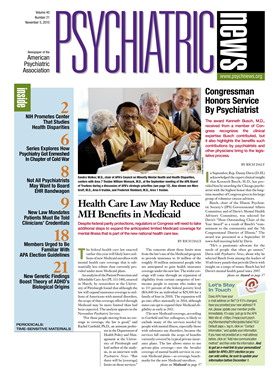The National Institutes of Health (NIH) established in September the National Institute on Minority Health and Health Disparities (to be known as NIMHD).
The institute takes over the activities of the former National Center on Minority Health and Health Disparities. The center's major role was to help strengthen the infrastructure for health disparities research, especially at institutions with little prior experience in such work.
NIMHD will review, coordinate, and evaluate all health disparities research conducted or funded by NIH. It will support ways to study and overcome the unequal burden of illness and difficulties of access to care among minority, poor, and rural populations in the United States.
“I expect the institute will continue to develop researchers from and working on medically underserved racial and ethnic groups,” said Annelle Primm, M.D., M.P.H., APA deputy medical director and director of the Office of Minority and National Affairs.
The transition to an institute was included in the Patient Protection and Affordable Care Act, passed last March.
“This change by Congress reflects the importance of studying the issue of health disparities with an even greater intensity,” said NIH Director Francis Collins, M.D., Ph.D., in a statement. “We need to learn much more about what causes disparities—including the role of society, the environment, and genes—and to find effective ways of overcoming or changing them.”
The center funded 88 “centers of excellence” and supported more than 2,000 loan-repayment awards to people in the health professions who were pursuing health-disparities research.
“I'm happy that it has been made an institute,” said Margaret Alegria, Ph.D., director of the Center for Multicultural Mental Health Research and a professor of psychology in the Department of Psychiatry at Harvard Medical School. “It shows that health disparities are an area of importance.”
How the change will affect mental health research specifically is still unclear. The National Institute of Mental Health (NIMH) already has an Office for Research on Disparities and Global Mental Health, which oversees research on global mental health, mental health disparities, and women's mental health. Discussions between NIMH and NIMHD are just beginning, and how they will coordinate their efforts remains to be seen, said an NIMH spokesperson.
The switch to institute status should increase the study of disparities in mental health service availability, access, and delivery, Alegria believes. She also said that engagement of ethnic and racial minorities in NIH-supported studies will increase. Although NIH policy calls for including members of minority groups in studies, the numbers sampled have been insufficient to test whether a study's overall conclusions matched results found with those for ethnic and racial minorities.
“We have made some progress toward eliminating health disparities,” said NIMHD Director John Ruffin, Ph.D., a biologist, in a statement. “Yet there is much unfinished business.”
